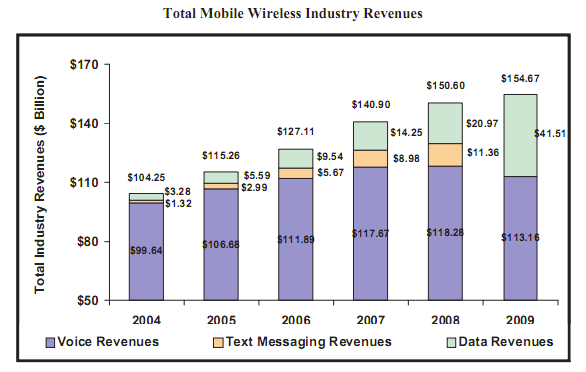Concentrated, yes, but competitive? FCC mum on wireless industry

As wireless giant AT&T moves to acquire smaller rival T-Mobile, a new report from the Federal Communications Commission indicates that the regulatory body remains officially neutral on the issue of whether the wireless industry is competitive or not.
In its 15th Annual Mobile Wireless Competition Report, regulators wrote yesterday that there's little doubt that the wireless phone market has become more concentrated in recent years.
But is it competitive?
The FCC acknowledged that it considered the wireless phone sector "effectively competitive" for the years leading up to 2010.
It wrote:
The mobile wireless ecosystem is sufficiently complex and multi-faceted that it would not be meaningful to try to make a single, all inclusive finding regarding effective competition that adequately encompasses the level of competition in the various interrelated segments, types of services, and vast geographic areas of the mobile wireless industry.
But in one of few hints within the report as to the commission's position on the pending $39 billion AT&T-T-Mobile merger, the commission said that mergers don't necessarily reduce competition.
From the report:
A merger can potentially form a stronger provider that restrains competitors from engaging in anticompetitive behavior, or may increase the likelihood that the merged firm may itself, or in coordination with other firms, would obtain or maintain market power.
Following the report, a few key players weighed in.
They said:
- CTIA: "While CTIA again wishes they would have concluded effective competition existed in 2009, consumers clearly enjoyed more advanced handsets, an ever-expanding range of services and applications and more robust networks, even as the Bureau of Labor Statistics reported that prices decreased...the wireless ecosystem continues to work for America and Americans."
- Verizon: "Our competitors aren't just other wireless-network providers, as this report seems to indicate. Today wireless competition comes from cable companies; Wi-Fi and satellite service providers; handset, tablet and laptop manufacturers; operating system and application designers, and many others."
Still, the situation remains precarious. According to the Herfindahl-Hirschman Index -- calculated by summing the squared market shares of all companies in any given market -- the industry closed out 2010 in a "highly concentrated" state.
(The index is a commonly used measure of industry concentration; "unconcentrated" is considered a score of less than 1500; "moderate concentration" between 1500 and 2500; "highly concentrated" above 2500. The industry has been highly concentrated since 2005.)
The question of course is how the AT&T-T-Mobile merger will affect HHI. If it sends it out of whack, there's little doubt the deal is harmful to the market...unless it's not, per the FCC's statement above.
